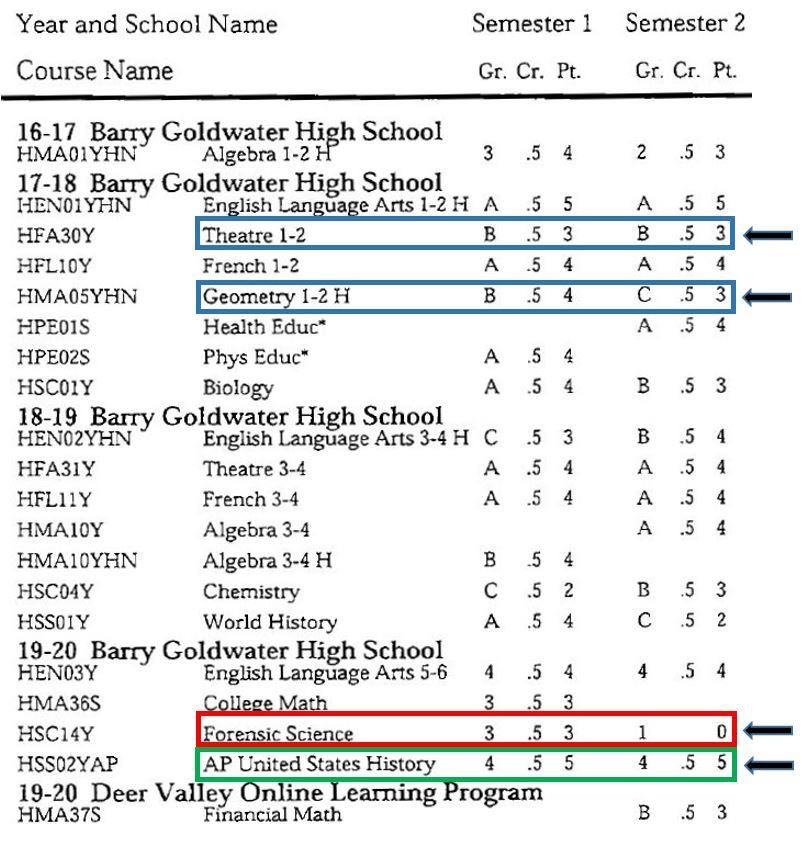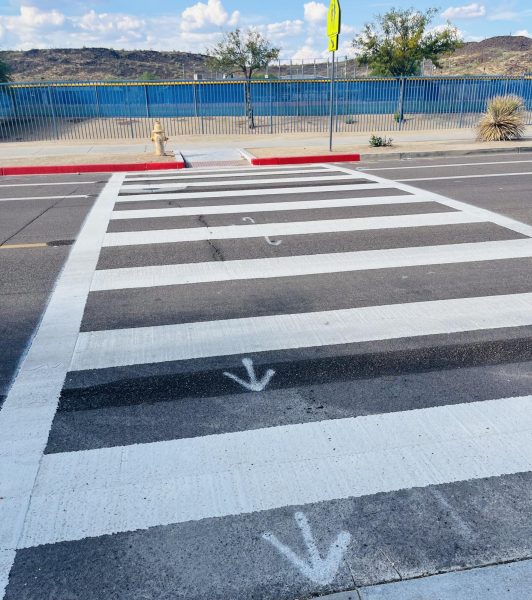New grading system creates controversy
A sample transcript provided by DVUSD shows what a potential OHS transcript could look like with the new grading policies.
November 10, 2021
With the new school year, an abundance of changes greeted the students and staff of OHS. One of the most prominent differences this year is the establishment of a brand new grading system. This never before used system grades students in a non-traditional way because it eliminates letter grades that were based on a 100-point scale. Instead, students are evaluated on their proficiency of the concepts being taught and then given a number between zero and four.
With this unfamiliar system came the significant distinction in the responses that were received. Some individuals believe this change will positively impact them, while others do not understand the reason behind its implementation. The root cause of this contrast is the confusion that surrounds this topic, since almost everyone has lingering questions regarding many aspects of this shift in the way students’ knowledge is assessed.
“[The new grading system] was a process that has been going on for like 3-4 years. There was a committee that had teachers, parents, administrators,” said Brad Brazell, administrator. “The goal was to first evaluate, are the grades accurate, defining what that means and then moving towards something that would become more accurate, if there was a problem.”
With this new practice, students wondered how the different policies regarding late work would change. In the past, if an assignment was turned in late, regardless if the reason was due to a student’s inability to complete it or their choice, they would lose points on their work. As a result, this year it was decided that teachers would be more lenient about this, and look at the reason the work was not turned in on time.
“Different children progress at different rates, and it doesn’t mean one is more intelligent than the other. We don’t want to punish a kid for not grasping it quicker,” Brazell said.
While this change in the late work policy is helping students who need extra time to complete assignments, some believe it also has the possibility of hurting them in the future. They are worried that if work can be turned in at any time, with no penalty, students’ willpower to complete it may decrease.
“It works really well for the motivated students, but if you’re not a motivated student, there’s no incentive. They don’t see that immediate gratification necessarily, so you can turn in an assignment any time and it’s not going to affect the grade book. Then there’s not that urgency to turn something in,” said Diane Hubbard, chemistry teacher.
Other policies are also proving to be mostly helpful for people who did not have perfect grades in the past. These new rules are allowing students to raise their GPA or keep it at the point that will show their understanding of the knowledge.
“It is helpful for people who don’t do that well in school because it’s a lot harder to fail a class, especially with the new retake policy, which is better for some people,” said Maya Shah, senior.
While individuals are finding faults in this grading system, the goal of it seems to be one that has the potential to help students succeed. However, the process of executing this new policy is something that might not have been done in the most ideal way.
“The intention is good. You want kids to master a standard and learn, and that’s the intent, but we’re phasing into it, and the phasing in process I don’t think does any justice. I think you’re either all in, or you’re not in at all,” Hubbard said.
With this seemingly very different grading system, students that are hoping to attend college in the future are wondering if their chances will become slimmer. They believe that colleges will be unfamiliar with this different way of recording grades, and as a result not have an accurate idea of the actual grade that a student received; however, this is not the case.
“We’re not the first school to do this. Universities are accepting children from not only all over the country, but all over the world. There’s different countries that don’t use the 100-point grading scale, so universities are pretty adept at handling all that,” Brazell said.
Some people are also wondering why the decision to reconstruct the grading system was made at the time that it was. With the other major changes that have occurred, they feel like it should have been withheld until life was completely back to normal.
“I feel like a year after COVID was not the greatest time to implement a new grading system because everyone’s still trying to go back to normal after a bunch of changes, and they just keep throwing change at us,” Shah said.
With the grading system being put into place, people are also able to compare it to the one that was used in years prior. While some people find that it is helping them, others feel like it would be ideal to simply go back to the old way of grading.
“It makes things more confusing. Last year you could see that your grade was lower and you would want to put in the effort to get it back up, so now that you don’t even know what your grade is, it’s harder to feel the motivation,” said Dylan Taylor, junior.
Teachers have also seen that some ambitious students are struggling to keep their grades where they want them. It is seemingly more challenging for these students, while for others they are content with their results.
“Just from what I’ve seen from my grades personally, it seems like the students who score lower are doing better, and it’s harder for the higher achieving students to maintain a higher grade. It seems more difficult to get fours, from what I’ve been experiencing,” Hubbard said.
On the other hand, some individuals feel like the new grading system shows great promise. They feel that they are able to prosper in school, because this change is focused on benefiting students.
“I think that there are a lot of different ways to raise [your grade], but I think it rewards people that don’t do their homework, but do good on tests,” said Jacob Gardner, junior.
Overall, the new grading system is giving students a new perspective on the efforts necessary in order to achieve the academic goals that an individual strives for. It has both positives and negatives, and the only way to determine a clear opinion is by waiting to see what the future will hold for this system.
“Anything new takes time for it to resonate and I think there’s a lot of confusion and I think a lot of people are doing things differently, and there’s not a lot of unity. I think we just need more time to figure out what we’re doing,” Hubbard said.















